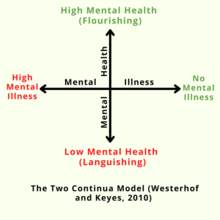Corey Keyes is an American sociologist. He is known for his work with positive psychology. Keyes currently teaches at Emory University in Georgia.
Work

Keyes works in the areas of complete mental health and methods for attaining positive social relationships. He also studies the psychology of aging. Keyes is known for coining the psychological terms flourishing and languishing,[1][citation needed] which describe a person's level of mental health, and has published widely in this field.[2] He is considered a pioneer in the field of positive psychology.[citation needed] Keyes is a member of an advisory board for the World Happiness Forum and a member of the Positive Psychology Network. His work has had wide-reaching policy implications. He has worked with the Centers for Disease Control and Prevention and his model of mental health as a complete state has been used by the Public Health Agency of Canada in a national surveillance program.[3]
Quotes
- We are living longer — on average 30 years longer than at the start of the 20th century — yet we are not living healthier. The question is: Are we just living dependent and sick, or are we living healthy and able to contribute? [3]
- I think we set up an impossible task, because our hedonistic version of happiness is impossible to sustain. But it is quite possible to feel fulfilled and content and that the world is meaningful by aligning yourself with some ideals, something that is bigger and better than you, and trying to live up to it.[3]
Books
- Languishing: How to Feel Alive Again in a World That Wears Us Down. 2024, Corey Keyes, Crown, 978-0593444627
- Women and Depression: A Handbook for the Social, Behavioral, and Biomedical Sciences. 2006, Corey L. M. Keyes (Editor), Sherryl H. Goodman (Editor) CUP, 978-0521831574
- Keyes, CLM and Haidt, J (Editors). (2003). Flourishing: positive psychology and the life well-lived. American Psychological Association, Washington, DC.
- Risk and Resilience in Human Development
- Social Functioning and Social Well-Being
Education
- B.A. University of Wisconsin-Eau Claire
- M.S. University of Wisconsin-Madison
- Ph.D. University of Wisconsin-Madison
References
- ^ Keyes, C. L. (2002). "The mental health continuum: From languishing to flourishing in life". Journal of Health and Social Behavior. 43 (2): 207–222. doi:10.2307/3090197. JSTOR 3090197. PMID 12096700.
- ^ CV Archived 2010-06-09 at the Wayback Machine
- ^ a b c Kim Urquhart. January 16, 2007. Live long and prosper Emory Report
External links
- Corey Keyes publications indexed by Google Scholar


Recent Comments